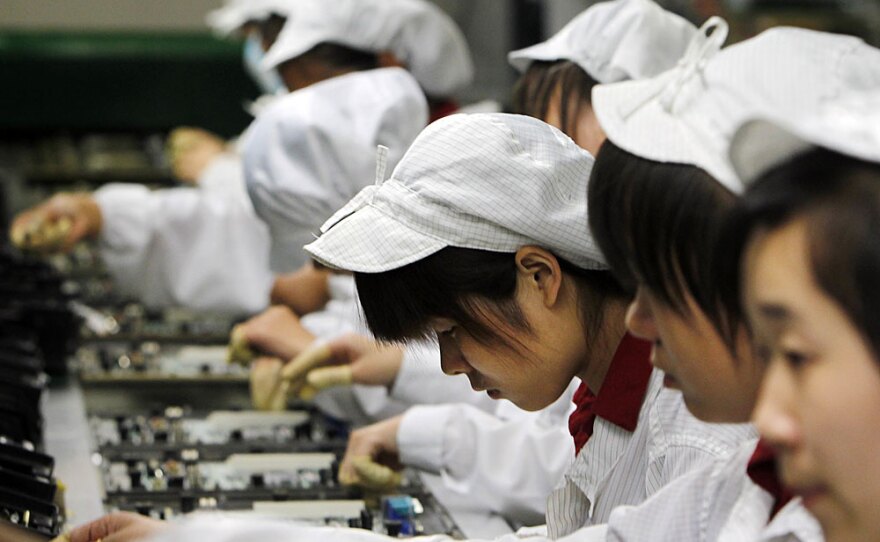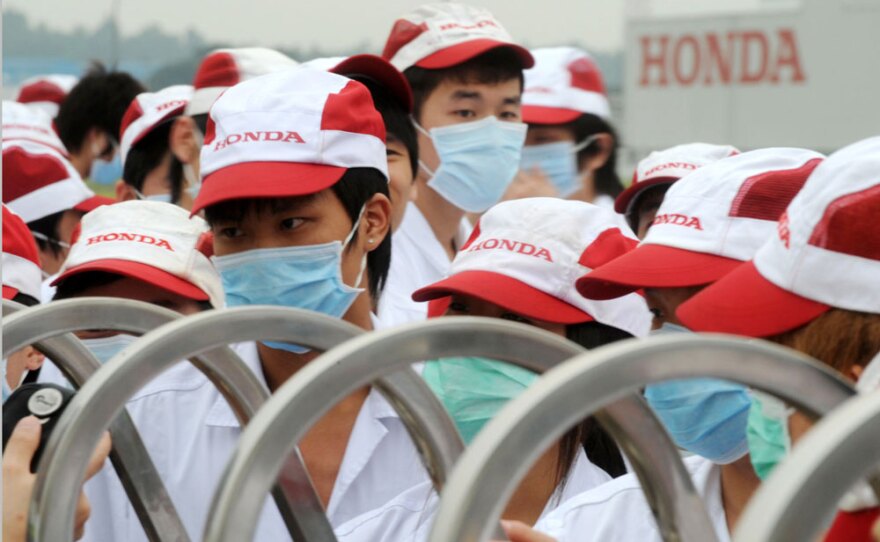Decades after China began its rise to become the world's factory floor, a new generation of young workers is manning China's factories. Some of them are not happy with the pay and working conditions, and they've responded with strikes, protests and even suicides.
In Zhongshan city, part of the industrial sprawl of south China's Pearl River Delta, the clatter of factory machines and the buzz of workers on motorcycles fill the humid air.
Last week, workers went on strike at a factory in southern China that makes locks for the Japanese carmaker Honda. Chinese law does not guarantee workers the right to strike.
With police looking on, nervous workers spoke to NPR on condition that they would be identified only by their last names. Authorities have so far allowed workers to organize at Honda Lock, but worker representatives say that police are keeping them under tight surveillance.
One worker, surnamed Wu, says it was a heady scene when almost all of the factory's 1,400 workers took to the street in protest.
"I was really excited. This was the first time I had participated in a big demonstration of more than a thousand people. I think that if the factory gives us a satisfactory answer, most workers won't want to leave," she says.
Higher Expectations Than Their Parents
The strike was the third to hit Honda suppliers in a month. The workers at Honda Lock were promised a $30-a-month raise, but they complain that striking workers at other Honda suppliers received more. For now, they're back at work, awaiting the result of negotiations between factory managers, worker representatives and officials.
Some of the workers at Honda Lock are themselves the children of factory workers. Wu says she has higher expectations than her parents' generation, partly because everything now costs more.
"I've been working here six years, and my salary has averaged less than $200 a month. Luckily I'm not married. For anyone with a family and kids, less than $200 a month just isn't enough to get by on," she says.

Labor experts point out that the younger workers lack their parents' mental toughness. They cite this as one factor behind the 10 suicides this year at nearby Foxconn, which makes iPhones and iPods for Apple.
Flexing Legal, Political Rights
But the younger generation is more aware of its democratic and legal rights. Each department at Honda Lock elected two workers' representatives. One worker surnamed Huang says his colleagues will definitely represent him better than the factory's official union.
"The union is really just part of the management. They're paid by the management, so they obey the management. What use are they? As far as we're concerned, there is no real union here," he says.
Ji Shao is a labor expert at the Capital University of Economics and Business in Beijing. She says that as the recession wanes, Pearl River Delta export firms are getting more orders from customers. Workers therefore expect more pay, and she says the unrest in the area is likely to spread.
She warns China's leaders to listen to the demands of the new generation of peasant workers.
"For China's government, caring about peasant laborers is caring about itself, and its own political power. If it fails to do so, there are plenty of examples of how China's industrialization could end up, such as Brazil, Mexico and India," Ji says.
There are also plenty of examples of workers' movements that have helped to oust repressive regimes, from China's own communist revolution to Poland's Solidarity trade union.
Government Takes Heed
Some of China's leaders are eager to show that they get the message.
Premier Wen Jiabao recently appeared on state television paying his respects to "a new generation of peasant laborers." He said China's new skyscrapers were built with their sweat. He urged government and society to treat the young workers as they would their own children.
Chinese leaders have also called for official labor unions to do a better job of representing workers.
Liu Linping, a labor expert at Zhongshan University in Guangzhou, says this won't be easy.
"This is related to China's basic political system. It doesn't mean the official labor unions are completely powerless; they're still capable of action. But this ultimately depends on the country's top leaders," Liu says.
Copyright 2022 NPR. To see more, visit https://www.npr.org. 9(MDAzMjM2NDYzMDEyMzc1Njk5NjAxNzY3OQ001))







